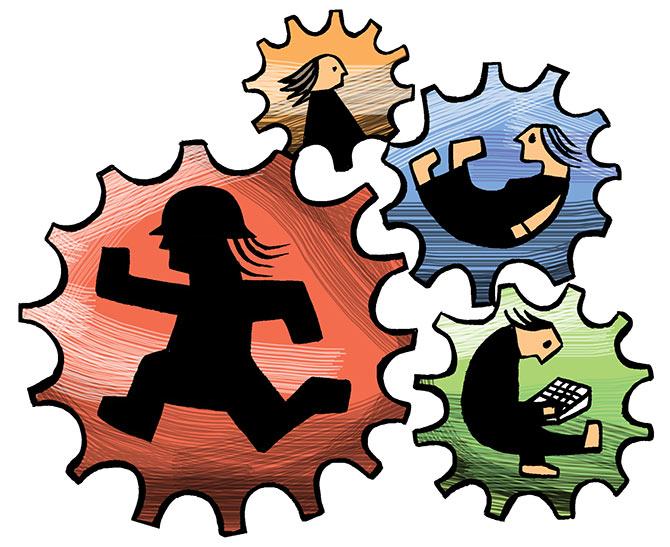Every cog in the wheel must present its unique services at the moment of instructed haste, says Vikram Johri.
Illustration: Uttam Ghosh/Rediff.com

Don't come to office, big banks command their employees, as Mumbai's high realty costs cut them deep.
A host of foreign banks, from Citi to Standard Chartered, now permit their employees to work from home, provided they are always connected.
Apart from the obvious monetary benefits, for employees the practice gives the lie to Tolstoy's famed adage: 'If you want to be happy, be.' Rarely does causation lead to such immediate delight as the chance to escape the confines of office.
With its emphasis on tech, the corporate world of today provides ample opportunities to fill up Excel sheets and design PowerPoint slides from the comfort of your bedroom.
Part of the attraction of working from home is the chance to escape those endless meetings where one is forever repeating the same point in newer and fancier language.
The pushback against working from home has traditionally stemmed from the fear that when employees residentialise their jobs, they stagger their output, something some of us already do with e-mail to give the impression that we are working into the small hours.
When an analyst is, say, slated to make three presentations on a day, he may plan them in such a way as to send out one in the morning, one post-noon and one late evening.
But the hitherto ubiquitous idea that being seen at work is somehow important for general morale and to check slackers is giving way to a DIY model where companies have started realising that there is little reason to hold employees captive if the work is getting done.
Besides, there is greater acknowledgement today of the productivity boost that a work-from-home arrangement can provide harried employees reconciling the demands of work and family.
To be sure, some sectors, such as newspaper journalism, cannot adopt a work-from-home model.
When the pages of the newspaper are 'released' (newspeak for sent to the printer), it wouldn't be far off the mark to describe the scene as 'instructed haste', a term otherwise reserved for the onerous task of extricating miners trapped underground.

Imagine a normal newsroom at 3 pm.
Somnolent reporters return from their "beats" and huddle around sipping tea as they criticise the government, the Opposition, the titans of industry, the media and their employer, in that order.
This is called the 'bureau'. Then there is the 'desk', home to the wordsmiths, where articles arrive and are cut, jabbed, poked, gored and rewritten until they are fit to grace the newspaper's pages.
By 5 pm, some activity begins.
The editor confabulates with the resident editor, the telecoms editor, the political editor and sundry others about the day's headlines.
The all-important edit meeting, where biscuits are devoured as stories fly thick and fast, prioritises the day's news.
Out go the vapid headlines about parliamentary disruption and celebrity shenanigans.
There is the odour of a new scam in the market.
This shall be exciting.
The desk begins to get its act together.
Articles pass around on e-mail, printouts rush over to 'design', detailed instructions reach the illustrator, data swims over to the graphics expert.
The room is alive with the possibilities of whatever will emerge on the page.
It's the same old, same old, but it's also new and fresh and vigorously impermanent ('Kill the anchor! Breaking News Just In!!').
But I digress.
The thing is you can't run journalism from home.
Every cog in the wheel must present its unique services at the moment of instructed haste.
Indeed, one may need an office environment to get into the work mindset.
Coworking spaces like CoWrks and WeWork are banking on the demand for 'hot desks' by freelancers and other non-committal workers looking to simulate a corporate environment during working hours rather than make Skype calls in their pyjamas.
The dichotomy reflects the ironic nature of the workplace today.
Real work -- coding for a project, connecting with a client, making a sales call -- requires a disciplined environment rarely found at home.
At the same time, offices drown employees in a host of activities -- offsites, say -- that blur the boundaries between work and otherwise.
I assume people would be happy to get in, finish their task and get out without having to be present to merely clock a fixed number of hours or to connect more than they need to with fellow employees.
As automation takes over ever more sectors, the requirement to be present only when one has to will come to define the work of the future.








